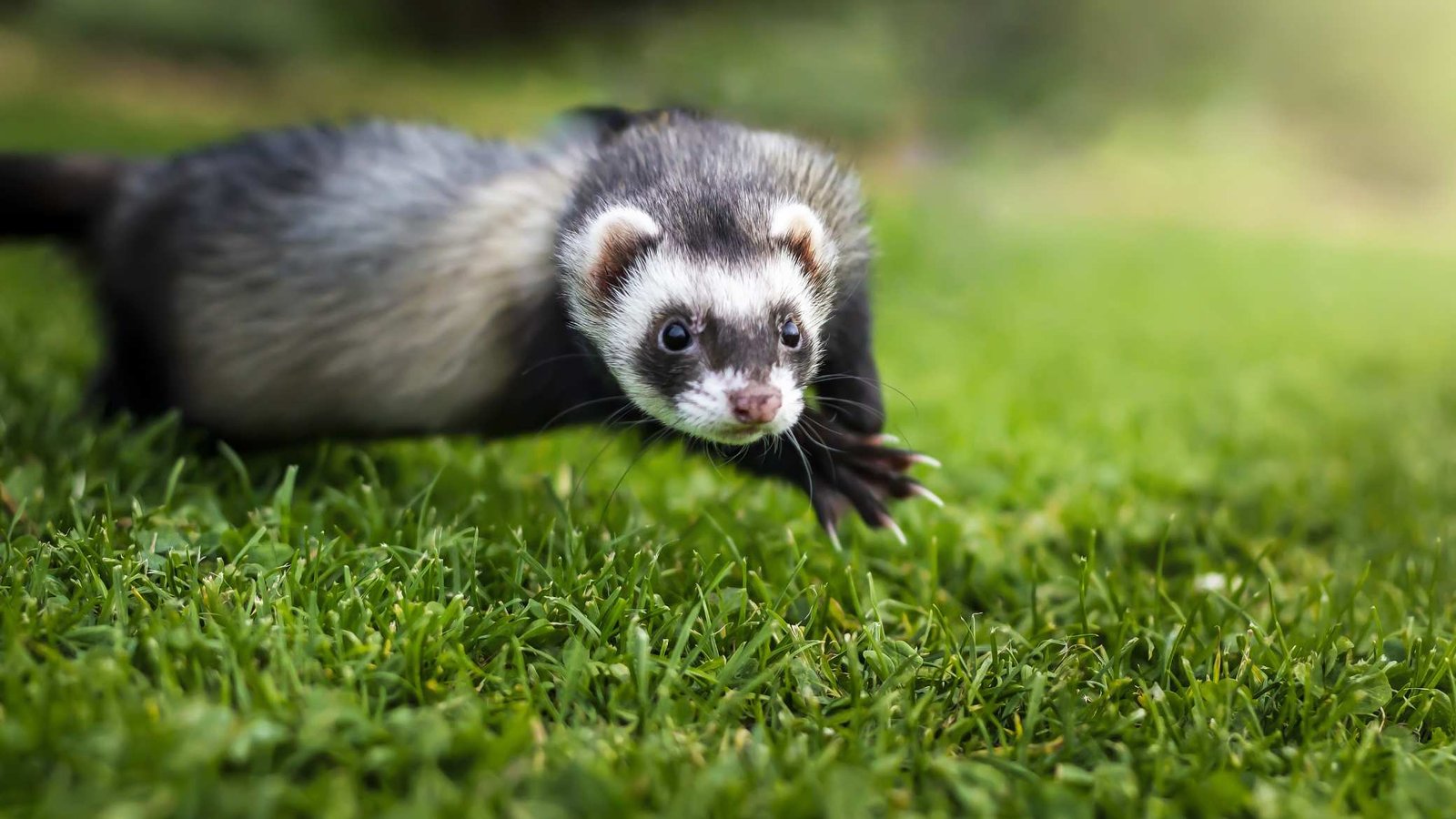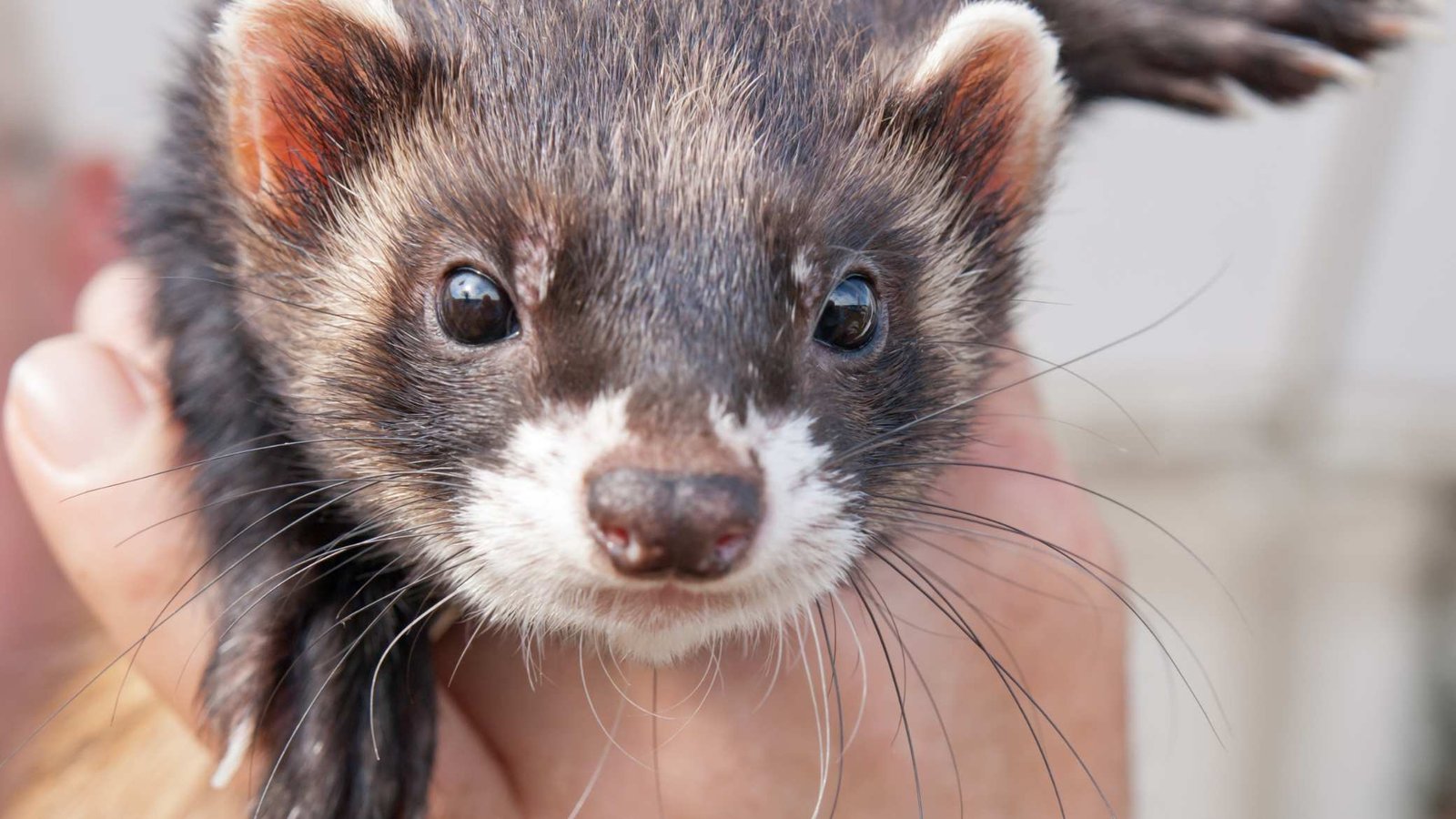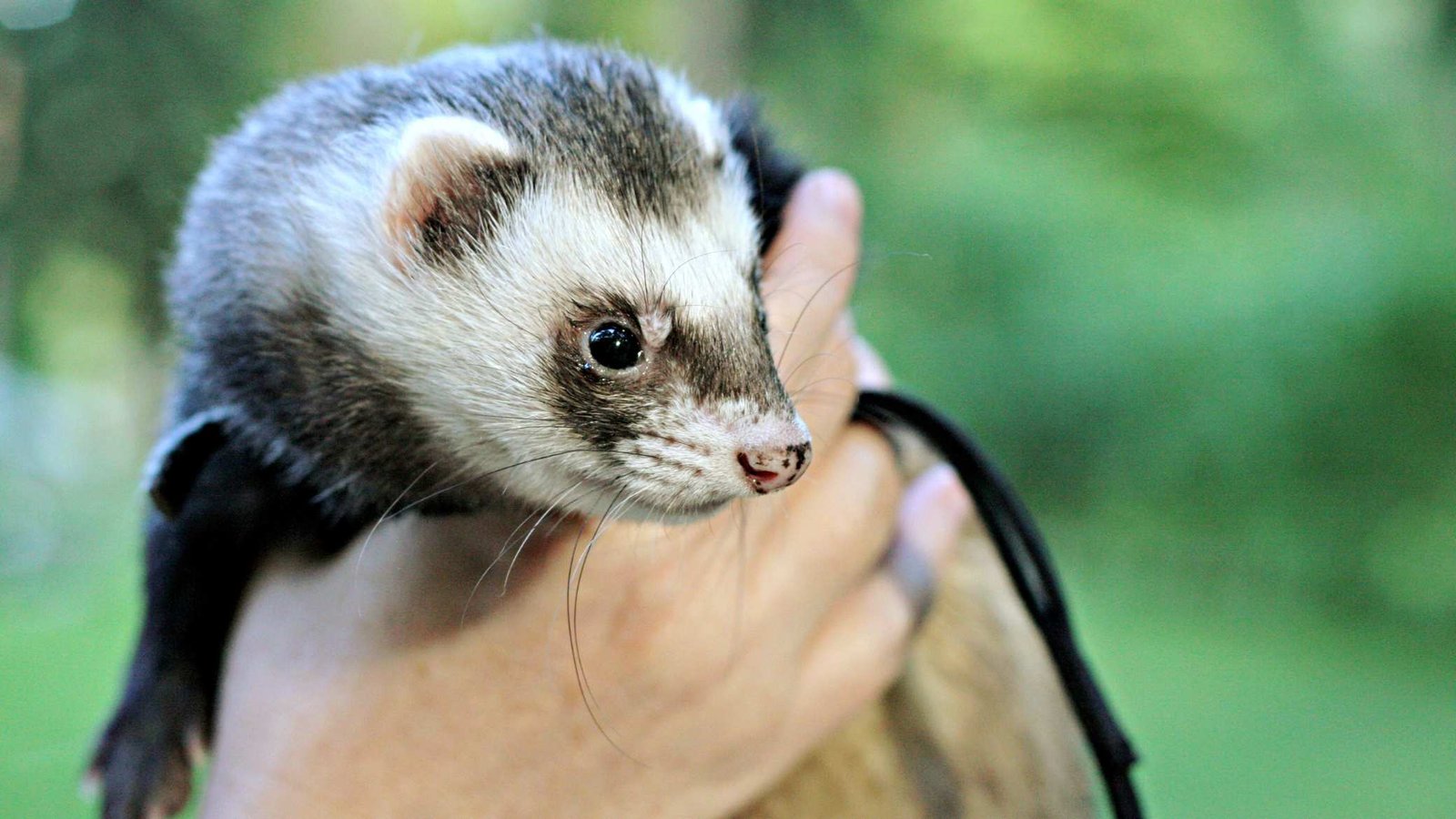If you’re thinking about getting a ferret as a pet, you might have heard that they have a strong smell. You might be wondering why ferrets have a distinct smell.
Ferrets indeed have a natural scent, but don’t let that stop you from having one as a cute and fun companion. Many ferret owners like their pet’s unique smell!
In this article, we’ll explore why ferrets have a distinct odor and share some tips on how you can reduce it if you decide to bring a ferret into your family.
Why Do Ferrets Smell?
Ferrets have a distinct smell that comes from their scent glands, especially the anal glands, used for marking territory. In the U.S., most pet ferrets undergo a procedure called “de-scenting,” which removes their anal glands. Although this reduces their natural odor, it doesn’t make them completely scentless. De-scented ferrets still have scent glands in their skin that can’t be removed.
Fun Fact
Each ferret has a unique and changing personal aroma throughout their life!
Read More: Why Do Ferrets Lick Their Lips: 3 Reasons You May Know
Why Do Ferrets Smell? Reasons
Ferrets have a distinct odor due to a combination of factors related to their biology and behavior. Here are some reasons why ferrets may have a noticeable smell:
-
Scent Glands: Ferrets have scent glands located near their anus and on the top of their heads. These glands produce a musky-smelling, oily substance. When ferrets groom themselves, they spread this oil on their fur, contributing to the characteristic smell.
-
Diet: The type of food a ferret consumes can affect its body odor. A poor-quality diet or one that is not suitable for ferrets may lead to a stronger, less pleasant smell.
-
Grooming Habits: Ferrets groom themselves frequently, and as mentioned earlier, the oil from their scent glands is spread on their fur during this process. While grooming is essential for their hygiene, it can contribute to the odor.
-
Bathing Habits: Bathing a ferret too frequently can strip their skin of natural oils, leading to an overproduction of the musky-smelling oil from their scent glands. This can result in an even stronger smell.
-
Litter Box Hygiene: Ferrets are generally trained to use a litter box, but if the litter box is not kept clean, it can contribute to an unpleasant odor. Ferrets also have a tendency to dig in their litter, potentially spreading odors around.
-
Age and Hormones: Young ferrets and those that are not neutered or spayed may have a stronger scent due to hormonal changes. Neutering or spaying can help reduce the intensity of their odor.
-
Living Environment: The environment in which a ferret lives plays a role in its odor. Poor ventilation, inadequate cleaning, and the presence of strong odors in the surroundings can all contribute to the overall smell.
While some level of odor is natural for ferrets, there are steps you can take to minimize it:
-
Regular Bathing: Bathing should be done sparingly, as frequent baths can strip their skin of natural oils. Aim for once a month or as needed.
-
Proper Diet: Providing a balanced and high-quality diet can help reduce the intensity of their body odor.
-
Clean Living Space: Regularly clean the ferret’s cage, litter box, and surrounding areas to minimize odors.
-
Neutering/Spaying: Having your ferret spayed or neutered can help reduce hormonal influences on their scent glands.
It’s important to note that while you can manage the odor, it’s challenging to eliminate it entirely as it is a natural part of a ferret’s biology. If you have concerns about your ferret’s smell, it’s advisable to consult with a veterinarian for guidance and to rule out any health issues.
How Can I Minimize The Smell Of My Ferrets?
Many ferret owners get used to the special scent of their pets. Meanwhile, there are several ways to keep your ferret’s musky odor to a minimum, making it easier for both you and your furry friend to coexist.
Tips for minimizing the natural smell of ferrets include:
- Have your ferret spayed or neutered.
- Keep your ferret’s habitat clean.
- Set up your ferret’s habitat in an area with good ventilation.
- Provide proper nutrition.
- Practice regular, species-appropriate grooming.
Have your ferret spayed or neutered.
If both male and female ferrets are not spayed or neutered, they tend to have a stronger smell. Intact males, especially during their heat, emit a particularly potent scent. Getting your ferrets spayed or neutered not only provides health benefits but also helps reduce the natural odor associated with ferrets.
Keep your ferret’s habitat clean.
Maintaining a clean environment is crucial to keeping unpleasant smells away, not only for ferrets but for all pets. Follow these housekeeping tips for ferrets:
- Wipe down surfaces and clean the litterbox daily, using a quality litter like Oxbow’s Eco-Straw to effectively absorb urine and control odors.
- Provide multiple beds, hammocks, and blankets, rotating and washing them regularly.
- Deep clean surfaces on a consistent schedule using pet-safe enzymatic cleaners for items like litter boxes, food dishes, toys, hides, and tunnels. Dishwash plastic and ceramic items for extra sterilization.
- Extend cleaning beyond the habitat to areas where ferrets play. Regularly check their favorite hiding spots, clean toys, treats, and other discoveries. If they play on carpets, deodorize with a sprinkle of baking soda, allowing it to sit before thorough vacuuming.
Set up your ferret’s habitat in an area with good ventilation.
The location of your ferret’s habitat is crucial. Ensuring good ventilation in their living space goes a long way in minimizing odors. If the room lacks proper ventilation, place a fan (directed away from the cage) to enhance airflow. Avoid positioning the ferret’s habitat near sunlit windows, as excess heat can intensify smells and discomfort your ferret.
Provide proper nutrition.
The quality of a ferret’s diet plays a crucial role in their smell. Since ferrets are obligate carnivores, similar to cats, it’s vital to avoid foods containing excessive amounts of unsuitable ingredients like corn, peas, and potatoes. Opt for high-quality food with elevated levels of protein and fat, and low fiber, such as Oxbow’s Essentials Ferret Diet. Be cautious with treats or fish-flavored food, as they can enhance your ferret’s odor. So, it’s best to avoid the Surf and Turf options!
Practice regular, species-appropriate grooming.
Resist the urge to bathe your ferret in an attempt to reduce their natural scent. Bathing removes their skin and fur’s natural oils, causing increased oil production in the scent gland and making the ferret’s scent stronger.
This can lead to a cycle of an unhappy ferret with a heightened scent and dry, irritated, and itchy skin. Ferrets are skilled at self-cleaning, so only bathe them when necessary.
Avoid using commercial odor-covering sprays and deodorizers, as they may cause similar problems and can irritate your ferret’s eyes and nasal passages. Most of these products only mask the scent and are best avoided.
Keep your ferret’s ears clean, as they naturally accumulate dark waxy build-up with a strong scent. Regularly check their ears, and when you notice wax build-up, clean it using cotton swabs and tissues. Avoid inserting swabs into the ear to prevent damage to the eardrum or pushing wax further into the ear canal.
While ferrets have a unique musky scent, many owners find it enjoyable, and others adapt to it quickly. The joy and entertainment ferrets bring to their owners’ lives far outweigh any noticeable odor.
By following the tips in this article, you can easily minimize the ferret smell and focus on the fun and joy they bring into your life.
Why do ferrets smell so bad?

Ferrets have a distinct smell due to scent glands, especially the anal glands, which they use for marking territory. This natural musky odor is more pronounced in intact (non-neutered) ferrets.
In the United States, many pet ferrets undergo a procedure called “de-scenting” to remove their anal glands, reducing the smell but not eliminating it.
Even de-scented ferrets still have scent glands in their skin, contributing to their unique aroma.
Regular bathing, proper diet, clean living spaces, and other care practices can help minimize the smell associated with ferrets.
Read more: Can Ferrets Eat Salmon? Things To Know Before Feeding
Why do ferrets smell like pee?
Ferrets may have a smell reminiscent of urine due to their natural musky scent, which comes from scent glands, particularly the anal glands, used for marking territory.
Additionally, ferrets have scent glands on their skin. While ferrets are known for their distinct odor, it’s essential to rule out any health issues, such as urinary tract problems or improper hygiene, that might contribute to a stronger urine-like smell.
Regular cleaning, proper diet, and veterinary care can help address and minimize any unwanted odors associated with ferrets.
Read more: Can Ferrets Have Catnip: Everything You Need To Know
Why do ferrets smell bad?
Ferrets have a natural musky odor that comes from their scent glands, especially the anal glands. This scent is used for marking territory, and it’s a characteristic feature of ferrets.
Even if ferrets are de-scented, a procedure that removes the anal glands, they still have scent glands in their skin, contributing to their unique smell.
The odor can be more noticeable in intact (non-neutered) ferrets. Regular cleaning, proper diet, and good hygiene practices can help minimize the smell, but it’s important to note that a faint musky scent is a natural part of a ferret’s biology.
Related article: Do ferrets eat cockroaches? Natural Diet of Ferrets
Why do ferrets smell so much?
Ferrets have a distinct smell primarily because of their scent glands, especially the anal glands, which they use for marking territory. This musky odor is a natural characteristic of ferrets and is more pronounced in intact (non-neutered) individuals.
In the United States, many pet ferrets undergo a procedure called “de-scenting” to remove their anal glands, which helps reduce the intensity of the smell. However, even de-scented ferrets still have scent glands in their skin, contributing to their unique aroma.
Regular cleaning, proper diet, and good hygiene practices can help manage and minimize the smell associated with ferrets.
Related article: How Long Can a Ferret Go Without Food? Unraveling the Mystery
Conclusion About Why Do Ferrets Smell
In conclusion, the unique smell associated with ferrets is primarily attributed to their scent glands, particularly the anal glands, used for territorial marking.
Even after undergoing de-scenting procedures, which remove the anal glands, ferrets still possess scent glands in their skin.
Factors such as diet, habitat cleanliness, and overall care play crucial roles in managing and minimizing the natural musky odor of ferrets.
While the smell is inherent to their biology, responsible pet ownership, including proper hygiene practices and a well-balanced diet, can significantly contribute to a more pleasant living environment with these delightful and entertaining companions.
FAQs About Why Do Ferrets Smell
Why do ferrets have a distinct smell?
Ferrets have a unique scent primarily due to their scent glands, especially the anal glands, which they use for territorial marking. Even after de-scenting procedures, ferrets still have scent glands in their skin.
Does the smell vary between male and female ferrets?
Yes, intact (non-neutered) male ferrets tend to have a stronger scent, especially during their heat. Spaying or neutering can help reduce the intensity of the smell.
Can diet affect ferret odor?
Yes, the quality of a ferret’s diet plays a role in its smell. A high-quality, protein-rich, and low-fiber diet, such as Oxbow’s Essentials Ferret Diet, can contribute to minimizing the natural musky odor.
Is it recommended to bathe ferrets to reduce their smell?
No, frequent bathing can strip natural oils from their skin and fur, leading to increased oil production in the scent gland and a stronger smell. Ferrets are adept at self-cleaning, so baths should only be done when necessary.
Do commercial odor-covering sprays work for ferrets?
Commercial sprays may mask the scent temporarily, but they can cause problems and irritate a ferret’s eyes and nasal passages. It’s generally recommended to avoid using these products.
How can habitat cleanliness impact ferret odor?
A clean living environment is crucial in minimizing ferret smell. Regular cleaning of their cage, litter box, and bedding, along with good ventilation, can significantly contribute to reducing unwanted odors.
Why do some ferret owners enjoy the smell?
Ferret owners may adapt to or even enjoy the unique musky scent of their pets. While the smell is inherent to their biology, the joy and entertainment ferrets bring often outweigh any noticeable odor for their owners.





